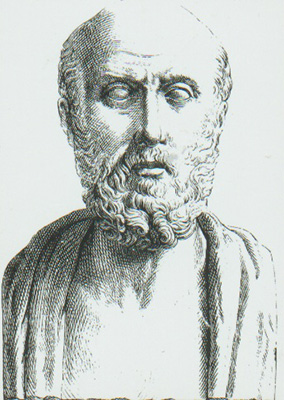Also known as:
Hippokratis, Ippokratis, Ιπποκράτης
More People of Greece
More Topic Categories
Related Destinations
Hippocrates (460 BC - 377 BC)
 Hippocrates was an Ancient Greek doctor and is considered to be one of the most prominent figures in the history of Medicine. He is also referred to as the father of modern Medicine, as an honour to his contribution in the field through the foundation of the Hippocratic Medical School.
Hippocrates was an Ancient Greek doctor and is considered to be one of the most prominent figures in the history of Medicine. He is also referred to as the father of modern Medicine, as an honour to his contribution in the field through the foundation of the Hippocratic Medical School.Although there is a plethora of information concerning the life of Hippocrates, most of them are false. Soranus of Ephesus, a Greek gynecologist of the 2nd century AD, was the first biographer of Hippocrates and the main source of information. Hippocrates was born in Kos in 460 BC and belonged to the prominent family of Asclepiades. According to tradition, his father Heracleides originated from the God of Medicine Asclepius, while his mother Phaenareti originated from mythological Hercules. He studied medicine at the famous Asclepion in Kos and after completing his studies, he started practicing his profession on the island. However, knowing how misled the other contemporary doctors were, he felt the urge to travel to other places, not only to teach them about his beliefs in clean air, water and sun, but also to expand his knowledge. Thus, he traveled to Delos, Thassos, Scythia, Thrace and Smyrna. He soon became famous beyond the borders of Greece, all the way to Persia. He last went to Thessaly, the land of his ancestors, where he stayed until the end of his life. He died in Larisa in 377 BC, aged 83.
During his travels, Hippocrates healed, taught, and kept records of his observations, theories and discoveries. After his death, his works eventually became the “Hippocratic Collection”. The Collection consists of 59 books written in the Ionic dialect, including seminars, studies, notes and philosophical essays revolving around medicine. These works were written for different audiences, and sometimes there are contradictions among them. In fact, some of the articles were written by other doctors who knew that anything that would be signed under the name of Hippocrates would be widely accepted.
In general, Hippocrates believed that everything derived from the four elements, and each of them contained the qualities of cold, dry, hot and wet. Moreover, the earthen predominated in the solid components of the body, while the aqueous was predominant in the liquid components of the body. The essence connecting everything was the spirit, which was innate and hot In humans and could be found in the heart.
The Hippocratic methodology consists of three fundamental concepts: clinical observation, experience and rationalism, and is also based upon the triadic disease concept: sick, sickness and doctor. According to this, the body contained a special power, called physis (nature), which governed the maintenance, development and healing of the body. To achieve this, Hippocrates believed that resting was of utmost importance. Moreover, the body consisted of four fluids: blood, phlegm, yellow and black bile. If balance was maintained among these four fluids, then the organism would be healthy and strong, while imbalance would mean the development of a disease.
See Also:
 Athens Photos
Athens Photos
 Santorini Photos
Santorini Photos
 Crete Photos
Crete Photos
 Meteora Photos
Meteora Photos
 Corfu Photos
Corfu Photos





